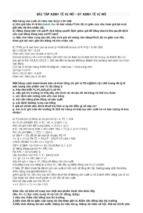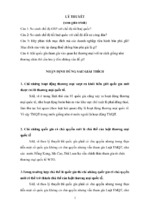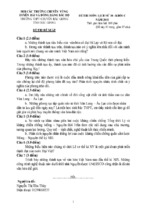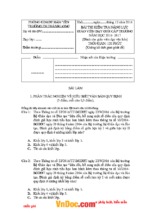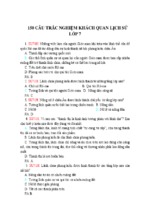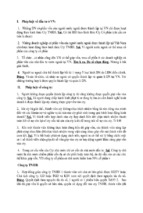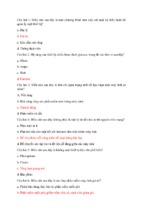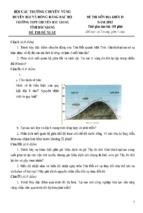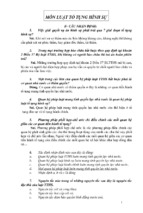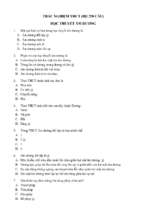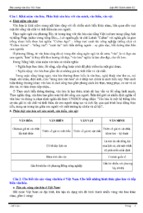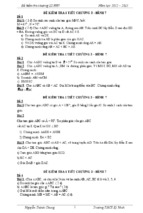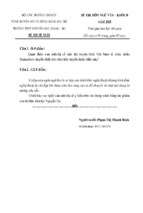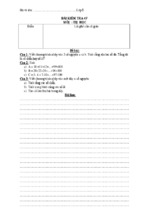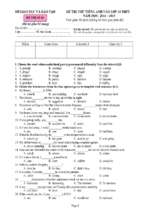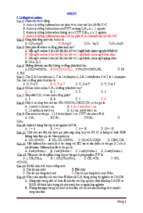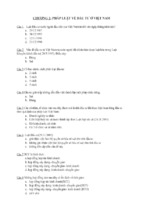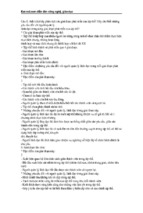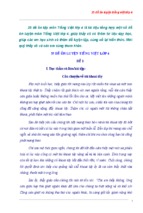Gia sư Tài Năng Việt
https://giasudaykem.com.vn
TÀI LIỆU TIẾNG ANH LỚP 9
REVISION-ENGLISH 9- 2nd TERM
School year: 2017 – 2018
A. READING COMPREHENSION:
I/
kindly
again
bags
disappointed
check
carefully
pollution
need
Mr. Brown is talking to some volunteer conservationists.
“I want everyone to listen (1) …………… , please. First of all, I‟d like you to divide into three groups.
Each group should take five plastic (2) …………… . Once you have filled a bag, come back to me as you will
(3) …………… another. I need group one to walk along the shore. Group two should (4) …………… the
sand, and group three has to check among the rocks. Mr. Jones is going to collect all the bags and take them to
the garbage dump. Mrs. Smith has (5) …………… provided a picnic lunch for us, but we won‟t eat until the
whole area is clean. If you can‟t find your place, I will help you get there with this map. Don‟t worry … uh …
I‟m (6) …………… that people have spoiled this area. However, we are here to do something about the
(7)……………. We must all work hard, and, if we work hard, we‟ll make this beach a clean and beautiful
place (8) …………… . OK. Now, let‟s get started.”
Answer the questions:
1. Who is the speaker? – …………………………………………………………………
2. Who are the listeners? – …………………………………………………………………
3. What will group one do? – …………………………………………………………………
4. What will group two do? – …………………………………………………………………
5. What will group three do? – ……………………………………………………………….
6. What will Mr. Jones do? – …………………………………………………………………
7. What will Mrs. Smith do? – ……………………………………………………………….
8. What will Mr. Brown do? – …………………………………………………………………
9. Where are they? – …………………………………………………………………………..
10. What are they going to do? – ………………………………………………………………
11. What will they achieve if they work hard today? – ………………………………………..
II/
from
ideas
covered
just
second-hand
folk
polluting
littered
MUMMY, OH MUMMY
“Mummy, oh Mummy, what‟s going to happen
If all the pollution goes on?”
“Well the world will end up like a (1) ………… junk-yard,
With all of its treasures quite gone.
The fields will be (2) ………… with plastics and tins,
The streams will be (3) ………… with foam.
Now throw those soda bottles over the hedge,
Save us (4) ………… taking them home.”
“But Mummy, oh Mummy, if I throw the bottles,
Won‟t that be (5) ………… the woods?”
“Nonsense! That isn‟t the same thing at all,
You (6) ………… keep quite and be good.
If you‟re going to start getting silly (7) ………… ,
I‟ll take you home right away.
-1-
Because pollution is something that other (8) ………… do,
We‟re just enjoying our day.”
Answer the questions:
1. According to the mother, what will happen if the pollution goes on?
– …………………………………………………………………………………….
2. Who does the mother think pollute the environment?
– …………………………………………………………………………………….
3. What will happen to the boy if he keeps on asking his mother such questions?
– …………………………………………………………………………………….
4. Do you think the boy‟s question ( lines 9 – 10 ) is silly? Why ( not ) ?
– …………………………………………………………………………………….
5. What does the poet want us to learn about keeping the environment unpolluted?
– …………………………………………………………………………………….
III/
plumber
dripping
recent
much
reduce
taking
enormous
see
Mrs. Mi: What‟s the matter, Mrs. Ha?
Mrs. Ha: I‟m worried about my most (1) ………… water bill. It‟s very (2) …………
Mrs. Mi: Let me (3) ………… . 200,000 dong! You should (4) ………… the amount of water your
family uses.
Mrs. Ha: How do I do that?
Mrs. Mi: First of all, get a (5) ………… to make sure there are no cracks in the pipes.
Mrs. Ha: I‟ll do that.
Mrs. Mi: Baths use twice as (6) ………… water as showers, so I suggest (7) ………… showers. And
remember to turn off the faucets. A (8) ………… faucet can waste 500 liters of water a month.
Mrs. Ha: I see. Thank you.
Answer the questions:
1. What is Mrs. Ha worried about? – ……………………………………………………………………
2. How much is her water bill? – ……………………………………………………………………….
3. Has Mrs. Ha checked the pipes in her house? – ……………………………………………………..
4. What does Mrs. Mi suggest? – ………………………………………………………………………
IV/
energy-saving
with
realize
innovations
for
luxuries
reduced
consumers
effectively
refrigerators
In Western countries, electricity, gas, and water are not (1) ………… but necessities. Companies now
(2)………… that consumers want products that will not only work (3) …………, but also save money.
For most North American households, lighting accounts (4) ………… 10 percent to 15 percent of the
electricity bill. However, this amount can be (5) ………… by replacing an ordinary 100-watt light bulb with
an (6) ………… bulb. These bulbs use a quarter of the electricity of standard bulbs and lasts eight times
longer. Therefore consumers can save about US$7 to US$21 per bulb.
For most North American households, lighting accounts for 10 percent to 15 percent of the electricity bill.
However, this amount can be reduced by replacing an ordinary 100-watt light bulb with an energy-saving
bulb. Therefore consumers can save about US$7 to US$21 per bulb.
In Europe, there is a labeling scheme for (7) ………… , freezers, washing machines and tumble dryers.
The label tells the (8) ………… how much energy efficiency each model has, compared (9) ………… other
appliances in the same category.
Ultimately, these (10) ………… will save money as well as conserve the Earth‟s resources.
Answer the questions:
1. What are Western consumers interested in?
– …………………………………………………………………………..
2. What can we do to spend less on lighting?
– …………………………………………………………………………..
-2-
3. Mrs. Jones uses only two ordinary bulbs and she pays US$8 for lighting. How much will she pay if she
uses two energy-saving bulbs instead?
– …………………………………………………………………………..
4. Do energy-saving bulbs last eight times longer than standard bulbs?
– …………………………………………………………………………..
5. What is the purpose of the labeling scheme?
– …………………………………………………………………………..
V/
freedom
chocolate
apart
for
celebration
Jewish
occurs
ancient
time
enjoy
joyful
celebrated
Although there are many celebrations throughout the year, Tet or the Lunar New Year holiday is the most
important (1) ………… for Vietnamese people. Tet is a festival which (2) ………… in late January or early
February. It is a time (3) ………… families to clean and decorate their homes, and (4) ………… special food
such as sticky rice cakes. Family members who live (5) ………… try to be together at Tet.
Passover is in late March or early April. This festival is (6) ………… in Israel and by all Jewish people.
On this festival, people celebrate (7) ………… from slavery. Passover is also an (8) ………… spring
festival. On the first and second nights of Passover, (9) ………… families eat a special meal called the Seder.
Easter is a (10) ………… festival which is celebrated in many countries. It happens at around the same
(11) ………… as Passover. On Easter Day (Easter Sunday), young children receive (12) ………… or sugar
eggs – as long as they are good. In many countries, people crowd the streets to watch colorful parades.
Answer the questions:
1.
When does Tet usually occur? – ………………………………………………………………………
2.
What do people usually do on this festival? – ………………………………………………………..
3.
What special food do they usually enjoy? – ………………………………………………………….
4.
Which country celebrates this festival? – ……………………………………………………………..
5.
When does Passover usually occur? – …………………………………………………………………
6.
What special meal do they usually enjoy? – …………………………………………………………..
7.
Which country celebrates this festival? – ……………………………………………………………..
8.
When does Easter usually occur? – …………………………………………………………………..
9.
What do they usually do on this festival? – …………………………………………………………..
10. What special food do they usually enjoy? – …………………………………………………………..
11. Which country celebrates this festival? – ……………………………………………………………..
VI/
tropical storm
predict
funnel-shaped
traveled
struck
from
Rim
collapsed
tidal waves
‘typhoon’
erupted
scientists
that
safely
Earthquakes: Ninety percent of earthquakes occur around the Pacific (1) …………, which is known as the
“Ring of Fire”. In 1995, a huge earthquake (2) ………… the city of Kobe in Japan. A large number of people
were killed when homes, office blocks and highways (3) ………….
Tidal waves: (4) ………… are the results of an abrupt shift in the underwater movement of the Earth. In the
1960s, a huge tidal wave hit Anchorage, Alaska. The tidal wave (5) ………… from Alaska to California!
Typhoons: When a (6) ………… reaches 120 kilometers per hour, it is called a hurricane in North and South
America, a cyclone in Australia, and a typhoon in Asia. The word „typhoon‟ comes (7) ………… Chinese: tai
means „big‟ and feng means „wind‟ , so the word (8) ………… means „big wind‟.
Volcanoes: We can usually (9) ………… when a volcano will erupt. Mount Pinatubo, which is a volcano in
the Philippines, (10) ………… in 1991. It was the world‟s largest volcanic eruption in more than 50 years.
Hundreds of people died, but thousands were saved because (11) ………… had warned them about the
eruption.
Tornadoes: Tornadoes are (12) …………storms which pass overland below a thunderstorm. They can suck
up anything (13) ………… is in their path. In Italy in 1981, a tornado lifted a baby, who was asleep in its baby
carriage, into the air and put it down (14) ………… 100 meters away.
Answer the questions:
-3-
1a. Do the majority of earthquakes in the world occur in the Ring of Fire? – ……………………
1b. What is the other name of “Pacific Rim”? – …………………………………………………..
2. What damage did the earthquake in Kobe in 1995 cause?
– …………………………………………………………………………..
3a. What is the tropical storm called in North and South America?/ in Australia? / in Asia?
– …………………………………………………………………………..
3b. What do we call a tropical storm in North and South America?/ in Australia? / in Asia?
– …………………………………………………………………………..
4.a Which country/ Where does the word “typhoon” come from? – …………………………………
4b.Which word did the Chinese language give us? – …………………………………………………
5. When can a tidal wave only occur?
– A tidal wave can only occur ………………………………………………………………………
6. Is the eruption of Mount Pinatubo the world‟s largest ever volcanic eruption? – ……………………….
7. What is a tornado?
– A tornado is a type of storm that ………………………………………………………………………...
VII / existence
a UFO
reported
traveling
more than
captured
an aircraft
sighting
aliens
pilot
UFOs are strange flying objects that some people report they have seen in the sky and believed to be
spacecraft from another planet. Many scientists do not believe so. They say that if people see a UFO, it might
be (1) ………… , a weather balloon or a meteor. However, there is still evidence for people to believe in the
(2) ………… of UFOs.
In 1947, Kenneth Arnold, an experienced (3) ………… in the USA, reported that he saw nine large round
objects (4) ………… at about 2,800 meters an hour to the left and north of Mount Rainier.
In 1952, there were (5) ………… 1,500 UFO sightings around the world.
In 1954, a woman and her children believed they saw (6) ………… above their house. The woman said
she saw two aliens in the spacecraft.
In 1964, a farmer claimed he saw an egg-shaped object in one of his fields and also (7) …………
collecting soil samples.
In 1971, two men claimed they were (8) ………… by aliens and taken abroad a spacecraft. After being
examined by the aliens, the men were freed.
In 1978, a young pilot and his plane disappeared after (9) ………… a UFO.
In 1981, Renato Nicolai, who was living in the south east of France, (10) ………… that he saw a platelike device at a treetop 30 meters away from his garden.
Answer the questions:
1. What can be mistaken for an alien spacecraft?
– …………………………………………………………………………..
2. What did the pilot see in 1947?
– …………………………………………………………………………..
3. Were there over 1,500 UFO sightings worldwide in 1952?
– …………………………………………………………………………..
4. What did the woman and her children see above their house in 1954?
– …………………………………………………………………………..
VIII/ interesting
perfect
circus
space
ready
mountains
push-ups
feel
condition
experience
orbit
see
-4-
If you decide to take the trip, you will have to get (1) ………… a few months before the flight. You must
be in excellent physical (2) …………. You should run a lot, swim every day, and do aerobics and
(3)………… . You must get a letter from the doctor that shows you are in (4) ………… health.
Once you get on the trip, you will be in a different world. You will (5) ………… pictures of the Earth.
You may also find your country and other (6) ………… places. You will be able to see the oceans, the big
rivers, the tall (7) ………… . You will be able to see them many times because you will (8) ………… the
Earth 16 times a day! You will also be able to get out of your seat and walk in the cabin. You will be able to
walk on the walls or on the ceiling like in a (9) ………… . You will not weigh anything! You will
(10)………… totally free and enjoy the wonderful feeling you have never had before. If you were on board
now, you would (11) ………… those marvelous things.
So do you think you will be able to take a (12) ………… trip? Start to dream now and your dream may
come true some day.
Answer the questions:
1. What will you have to do if you decide to take a space trip?
– …………………………………………………………………………..
2. What must you do if you want to show you are in perfect health?
– …………………………………………………………………………..
3. What scenes on the Earth can you see from outer space?
– …………………………………………………………………………..
4. Can you see those scenes 18 times a day?
– …………………………………………………………………………..
5. What things can you do while you are in orbit that you cannot do when you are on the Earth?
– …………………………………………………………………………..
IX / experience
temperatures
turn up
between
coast
Delta
forecast
case
met
thunderstorms
trust
a raincoat
Thuy is talking to her grandmother.
Thuy:
Grandma, it‟s the weather forecast on TV.
Grandma: Can you (1) ………… the volume, Thuy?
Thuy:
Yes, Grandma.
Here is tomorrow‟s weather forecast. Ha Noi and areas to the north will be sunny. Ha Noi will have
temperatures between 23oC and 27oC. It will be raining along the (2) ………… of Thanh Hoa. The southcentral coast can expect thunderstorm. Hue will (3) ………… temperatures (5) ………… 25oC and 30oC.
There will also be (4) ………… over the central highlands. Areas around the Cuu Long (6) ………… can
expect clouds during the day. Ho Chi Minh City‟s (7) ………… will be between 27oC and 35oC.
Thuy:
That‟s all, Grandma.
Grandma: Thank you, dear. What are you doing?
Thuy:
I‟m preparing for a picnic with some old friends of mine. We haven‟t (8) ………… since we left
school. We‟re going to a park on the other side of the river.
Grandma: Don‟t forget to bring along (9) ………….
Thuy:
But Grandma, the (10) ………… says it‟ll be sunny.
Grandma: I never (11) ………… weather forecasts.
Thuy:
You don‟t miss a single one on TV, do you?
Grandma: But I like watching them, dear.
Thuy: Alright Grandma, I‟ll bring a raincoat just in (12) ………… . I hope my friends won‟t laugh at me.
Answer the questions:
1. What does Thuy‟s grandma want her to do?
– …………………………………………………………………………..
2. Why does Thuy‟s grandma want to her to turn on the volume on TV?
– …………………………………………………………………………..
-5-
3. What will the weather like along the coast of Thanh Hoa?
– …………………………………………………………………………..
4. Will Hue‟s temperature be between 25 oC and 35oC?
– …………………………………………………………………………...
5. Where is Thuy going to go?
– …………………………………………………………………………..
6. Does Thuy‟s grandma trust the weather forecasts?
– …………………………………………………………………………..
X/
hug
standing
go
will
forever
remember
Dad
never
Daddy, I am writing to tell you how much you are missed and loved. I will always (1) ………… that day –
my wedding day. You were (2) ………… there with tears in your eyes while I was walking towards my
groom. You gave me a (3) …………, and the feeling that you (4) ………… wanted to let me go. But at last I
had to leave you and start my new life… a moment in time that lasted (5) …………. I now have children,
Dad, but I (6) …………always be your little girl! Happy Father‟s Day.
priority
generous
best
from
of
must
Dad
never
You ask me what I think about my dad. Great! Great! I (1) ………… tell you my dad is the (2)…………
person in the world. Do you know what I mean? He is a considerate and (3) ………… man who is loved not
only by his family but also by all his friends. His (4) ………… is always his family. His sense of humor
distinguishes him (5) ………… others. In a word, my dad‟s terrific! I‟m so proud (6) ………… him and love
him so much. Happy Father‟s Day, Daddy!
B. GRAMMAR:
I/ TENSES: ( thì )
1. Simple past tense (Thì Quá khứ đơn ):
* Từ nhận diện: yesterday, last, ago, mốc thời gian ở quá khứ ví dụ 1995, 2002, …
- To be: was, were
I/ He/ She/ It/ 1
was ( not )
_ Was I/ he/ she / it / 1--- ?
We/ You/ They/ 2 were ( not )
_ Were we/ you/ they/ 2 ---?
- Ordinary verbs: ( động từ thường )
Động từ có qui tắc ( hợp qui tắc ): thêm “ed” ( Ved ) _ Phủ định: didn‟t + V _ Nghi vấn: Did + S +V ?
Động từ bất qui tắc: sử dụng cột 2 ( V2)
2. Present perfect tense ( Thì Hiện tại hoàn thành ):
* Từ nhận diện: since, for, just, already, ever, never, recently, yet, up to now, so far, …
- Cách chia:
+ Khẳng định:
He / She / It / 1 :
has + V3/ Ved
I / we / you / they / 2 : have + V3/ Ved
+ Phủ định: hasn‟t / haven‟t + V3/ Ved
+ Nghi vấn: Has/ Have + S + V3/ Ved?
II/ MODAL VERBS:
– Sau động từ khiếm khuyết : can, could, shall, should, will, would, may, might, must, ought to,
have to + động từ nguyên mẫu không “to”.
– Động từ khiếm khuyết không thay đổi theo bất kì chủ ngữ nào.
EX: It may be a book or it might be a game.
1. It may be a box of crayons or it might be a box of plaint.
2. It may be a football or it might be a basketball.
III/ VERB FORMS:
VERB FORMS:
Ex: I suggest going to the movies .
1) suggest + V-ing …
I suggest (that) we should go to the movies.
suggest(that) S + should + V …
-6-
2) I think we should + V…
8) How about + V-ing …?
Ex: I think we should go to the movies.
Ex: How about going to the movies?
3) Shall we + V …?
9) What about + V-ing …?
Ex: Shall we go to the movies?
Ex: What about going to the movies?
7) Why don‟t we + V…?
10) Let‟s + V…
Ex: Why don‟t we go to the movies?
Ex: Let‟s go to the movies.
4) need …+ toV
11) „d like/would like … + to V
5) look forward to +V.ing
12) let + O + V
6) Theo sau các giới từ là động từ thêm “ing” Ex: on/ at/ about/ to/by/ …+V.ing
* GERUND ( Danh động từ : động từ thêm “ing” )
Theo sau các trường hợp sau đây ta thường sử dụng động từ thêm “ing”:
1.Verbs ( Động từ): like, love, hate, enjoy, stop, suggest ( đề nghị ), practice/ practise ( thực
hành), miss ( bỏ lỡ ), avoid ( tránh ), begin, start, spend , … + V.ing
Ex: a. The sale of jeans stopped growing because the worldwide economic situation got worse in the
1990s.
b. She practices speaking English everyday.
2. Prepositions ( Giới từ ): in, at, for, from, to, by, after, before, …
Theo sau các giới từ nếu là động từ thì thông thường là hình thức động từ dạng nguyên mẫu thêm
“ing”
Ex: a. I‟m good at drawing.
b. He doesn‟t concentrate on the lesson. He thinks of listening to pop music.
3. be used to/ get used to/ look forward to/ be fond of + V.ing:
Ex: a. My father is used to getting up early. b. I am fond of wearing jeans.
1. I‟m sorry. I (not phone) …………………… you last night.
2. Trang just ( win ) …………………… the first prize in the English speaking contest.
3. We ( not meet ) …………………… since we left school.
4. In 1995, a huge earthquake ( strike ) …………………… the city of Kobe in Japan.
5. In Italy in 1981, a tornado lifted a baby, who ( be ) ………… asleep in its baby carriage.
6. If people see a UFO, it might ( be ) ………… an aircraft, a weather balloon or a meteor.
7. ………… you ever ( see ) ………… any films on UFOs?
8. In 1971, two men claimed they ( capture ) …………………… by aliens.
9. ………… you ever ( hear) …………………… about UFOs?
10. Let me (congratulate) …………………… on your nomination.
11. Why don‟t you (go) …………………… to school by bike to save energy?
12. How about (turn) …………………… off the faucets before going out?
13. It‟s a time for families (clean) …………… and (decorate) …………… their homes.
14. It‟s nice/ kind of you (say) …………………… so.
15. Mrs. Mi suggests (get) ……………… some stool to check cracks in the pipes.
16. I suggest (give) ………………… lessons to poor children.
17. What about (use) ………………… public buses instead of motorbikes?
18. I think you should (take) …………………… a shower instead of a bath to save energy.
19. I suggest that you should (do) ………………… some reading every day.
20. It is possible to (store) …………………… solar energy for a number of days.
21. We can protect the environment by (reduce) …………………… air pollution.
22. Why don‟t we ( reduce ) …………………… the gas?
23. Let me (pay) …………………… for the meal. You paid last time.
24. I‟d like you ( divide ) …………………… into three groups.
25. I need group one ( walk ) …………………… along the shore.
26. I suggest ( take ) …………………… showers to save water.
27. I suggest that you should ( take ) …………………… showers instead of baths.
-7-
28. Mrs. Ha suggests ( get ) …………………… some tool to check cracks in the pipes.
29. How about/ What about ( use ) …………………… bikes instead of motorbikes?
30. What will happen to the boy if he keeps on ( ask ) …………………… his mother such questions?
31. I look forward to ( hear ) …………………… from you soon.
32. We can reduce garbage by ( collect ) …………………… plastic bags.
33. Let‟s ( turn ) …………………… off all the faucets right after using them.
34. Shall we ( use ) …………………… bicycles instead of motorbikes.
35. I need group two ( check ) …………………… the sand.
36. I think we should ( reduce ) …………………… the gas.
37. I‟m looking forward to ( hear ) …………………… from you.
38. What does the poet want us to learn about ( keep ) …………………… the environment unpolluted?
39. Thuy‟s grandma wants ( listen ) …………………… to the weather forecast.
40. Can you ( turn ) …………………… up the volume, Thuy?
IV/ Conditional sentences:
Type
If clause
Main clause
Type 1 ( LOẠI 1 )
Simple present tense (thì hiện tại đơn)
Simple future
Đkiện có thể xảy ra ở ( be )
am/ is / are
(V)
WILL + V
htại or tương lai
( not be )
am not/ isn‟t / aren‟t
(not V)
Will not + V/
(V)
I/ We/ You / They / 2 V
Won‟t + V
He/ She/ It/ 1
Vs/es /
(can)
can
(not V) I/We/You /They/2 don‟t + V
(may)
may
He/ She/ It/ 1
doesn‟t + V
(must)
must
Type 2 ( LOẠI 2 )
Past subjunctive (Quá khứ giả định)
(V)
WOULD + V
Đkiện không thể xảy (be)
were
(not V) Wouldn‟t + V/
ra ở htại or tương lai
( not be )
weren‟t/ were not
Would not V
( V)
Ved/ V2
(can)
could
( not V )
didn‟t + V
(may)
might
(must)
had to
Ex: Type 1: If the rice paddies ( be ) are polluted, the rice plants ( die ) will die
Type 2: If he ( be ) were you, he ( not do ) wouldn’t do that.
Drill: Complete the following sentences with the correct form of verbs in brackets:
1. If Ba ( forget) …………………… his lunch, he‟ll be hungry at lunch time.
2. Lan ( miss ) …………………… the bus if she does not hurry.
3. If Ha ( not be ) …………………… careful, she‟ll drop the cup.
4. Mrs. Nga will join us if she ( finish) …………………… her work early.
5. If Mrs. Binh writes a shopping list, she ( not forget ) …………………… what to buy.
6. If Mr. Loc ( have ) …………………… a car, he would drive to work.
7. If Lan lived in Ho Chi Minh City, she ( visit ) …………………… SaiGon Water Park.
8. If Nam had an alarm clock, he ( arrive ) …………………… at school on time.
9. If Hoa ( live ) …………………… in Hue, she would see her parents every day.
10. If Nga ( own) …………………… a piano, she would play it very well.
11. If Tuan ( study ) …………………… harder, he would get better grades.
12. If Na had enough money, she ( buy ) …………………… a new Computer.
13. If I ( meet ) …………………… an alien from outer space, I would invite him to my home and talk.
14. If Ba ( be ) …………………… rich, he would travel around the world.
15. If there ( be ) ………… too much exhaust fume in the air, more and more people will cope with
respiratory problems.
16. If we pollute the water, we ( have ) …………………… no fresh water to use.
17. If people stop using dynamite for fishing, a lot of creatures ( be ) ………… well preserved.
18. If you ( cut ) ………… down the trees in the forests, there will be big floods.
19. If we ( work ) …………………… hard, we will make the beach a clean and beautiful place again.
-8-
20. If you can‟t find your place, I ( help ) …………………… you to get there with this map.
21. If the pollution ( go ) …………………… on, what will happen?
22. If the boy ( keep ) …………… on asking his mother such questions, she will take him home right away.
23. If we plant more trees along the streets, we (have) …………………… more shade and fresh air.
24. If the paddies are polluted, the rice plants ( die ) ……………………
25. If we keep our environment clean, we (live) …………………… a happier and healthier life.
26. If it (not, rain) ……………………, we will go to the movies.
27. If they (be) ………… students, they must wear uniform.
28. We‟ll live a healthy life if we ( keep ) …………………… the environment clean .
V/ PREPOSITIONS:
1. divide into: chia thành
14. look for: tìm kiếm
2. prevent … from: ngăn ngừa
15. look after = take care of: trông nom, chăm sóc
3. save … from: cứu, cứu thoát
16. just in case: dự phòng
4. distinguish … from: phân biệt với
17. satisfy with: thỏa mãn với
5. different … from: khác biệt với
18. between…and: giữa
6. keep on: cứ, tiếp tục làm
19. look forward to: trông đợi, mong mỏi
7. go on: tiếp tục
20. help … with: giúp ai
6. congratulate/ congratulation … on
21. proud of: tự hào về
7. cope with: đương đầu với
22. kind/ nice of
8. turn on: mở ≠ turn off : tắt
23. take part in = join in: tham gia
9. turn down: vặn nhỏ ≠ turn up: vặn lớn
27. known as: được biết như là
10. instead of : thay vì
28. get out of : thoát khỏi
11. account for: chiếm
29. come from: đến từ, bắt nguồn từ
12. be interested in: thích, quan tâm
30. sense of humor: tính hài hước
13. sum up: kết luận
Complete the sentences. Use the suitable prepositions:
1. Please bring some raincoats just ………… case.
2. Thu Ha is not satisfied ………… her preparations for Tet.
3. Ho Chi Minh City will have temperature ………… 270C and 350C.
4. The music is too loud. Can you turn it ………… a little?
5. She is very proud ………… her father. His life is a shining example to her.
6. His sense ………….. humor distinguishes him ………… other.
7. That‟s very kind/ nice ………… you to say so.
8. Thuy‟s grandma wants her to turn ………… the volume on TV because she wants to listen to the
weather forecast.
9. I send my congratulation ………… his nomination.
10. Tuan has taken part ………… different charity activities in his town.
11. Are you satisfied ………… these decorations?
12. Please turn ………… the TV. I am studying my lesson.
13. Although my father is only a farmer, I am proud ………… him.
14. I congratulated him ………… his excellent achievement.
15. Ha Noi‟s temperature will be ………… 220C and 250C.
16. She tried to prevent the dog ………… running into the road.
17. It‟s very nice ………… you to say so.
18. Let me congratulate you ………… your nomination.
-9-
19. Hanh can‟t go to the movies with us tonight. She will have to look ………… her little sister.
20. If we go ………… wasting water, there will be a shortage of fresh water in a few decades.
21. Turn ………… the TV for me, will you? I want to watch weather forecast.
22. I think I‟ve lost my new pen. I‟ve looked ………… it everywhere and I can‟t find it anywhere.
23. Mrs. Yen forgot to turn ………… the faucet when she left for work.
24. I‟d like you to divide ………… three groups.
25. Put garbage bins around the schoolyard to prevent lazy students ………… throwing trash.
26. Throw those soda bottles over the hedge to save us ………… taking them home.
27. If the boy keeps ………… asking his mother such questions, she‟ll take him home right away.
28. I look forward ………… hearing from you soon.
29. I think we should take a shower instead ………… a bath to save energy.
30. In conclusion, you must sum ………… what you have said.
31. I look forward to hearing ………… you soon.
32. If all the pollution goes …………, the world will end up like a second-hand junk-yard.
33. If there is too much exhaust fume in the air, more and more people will cope ………… respiratory
problems.
34. For most North American households, lighting accounts ………… 10 percent to 15 percent of the
electricity bill.
35. Ninety percent of earthquakes occur around the Pacific Rim, which is known ………… the “Ring of
Fire”.
36. The word „typhoon‟ comes ………… Chinese.
37. Although Mrs. Thoa was tired, she helped Tuan ………… his homework.
38. You will also be able to get out ………… your seat and walk in the cabin.
VI/ Connectives ( Liên từ ): and, but, because, or, so, therefore, however, though, although, even though
Có chức năng nối các từ, các mệnh đề, các câu lại với nhau.
Drill: Use “and ; but ; because ; or ;so ; therefore; however ; though, although, even though ” to fill in
the blanks.
1. ………… we don‟t have a Mother‟s Day in Viet Nam, Dad and I have special gifts and parties for my mom
every year on the 8th of March.
2. I‟d love to play volleyball ………… I have to complete an assignment
3. We went to Ha Noi to watch colorful parade on National Day ………… we live in Nam Dinh.
4. Hoa failed her math test. ………… , she has to do the test again
5. It rained yesterday ………… the weather bureau predicted the weather would be fine.
6. It‟s raining, ………… I can‟t go to the beach.
7. Ba‟s hobbies are playing football ………… collecting stamps.
8. ………… in Australia, Christmas season is in summer, the Australians enjoy Christmas as much as people
in European countries do.
9. Thu Ha is not satisfied with her preparations for Tet ………… she has decorated her house and made plenty
of cakes.
10. Mrs. Quyen bought com, potatoes ………… cabbage at the market.
11. Nam got wet ………… he forgot his umbrella.
12. Many tourists enjoy festivals in Viet Nam ………… they do not understand Vietnamese culture very
much.
13. Na is very tired. ………… , she has to finish her homework before she goes to bed.
14. Jim could see the main part of the show ………… he came to the show late due to the traffic jam.
15. ………… Mrs Thoa was tired, she helped Tuan with his homework.
16. ………… Liz has an exam tomorrow, she is still watching TV.
17. Do you want Vietnamese tea ………… milk tea?
18. Ba ate a lot of food ………… he wasn‟t very hungry.
19. ………… the keyboard wasn‟t working well, she tried to finish her letter.
- 10 -
VII/ Writing:
A. Making Suggestions (Đưa ra lời đề nghị)
1. SUGGEST + V-ING: Ex: I suggest collecting some money.
2. SUGGEST + (that) + S + should +V: Ex: I suggest (that) you should speak English in class.
Let‟s + V = Shall we + V ? ; Why don‟t we + V.................? ; What about + Ving .................
How about + Ving .................? ; I think you should + V ............
Drill: Rewrite these sentences. Use “suggest”:
Ex: I think we should turn off the faucet.
I suggest turning off the faucet.
Or I suggest ( that ) we should turn off the faucet.
1. I think we should take a shower instead of a bath to save energy.
I suggest ………………………………………………………………………….. .
2. Shall we use bicycles instead of motorbikes?
I suggest ………………………………………………………………………….. .
3. How about making posters on energy saving and hanging them around our school?
I suggest …………………………………………………………………………...
4. Why don‟t we give lessons to poor children?
I suggest …………………………………………………………………………...
5. You should go to work by bike. I suggest ……………………………………………………
6. I want her to sing a song. - I suggest …………………………………………………………
7. Shall we go to school by bus? - I suggest ……………………………………………………
8. Let‟s organize a show to raise money. - I suggest … …………………………………………
9. Why don‟t you work harder on your pronunciation.
- I suggest …………………………………………………………………………..
C. RELATIVE CLAUSES WITH “WHO” AND “WHICH”:
1. who: được dùng thay thế cho từ đứng trước biểu đạt cho người làm chủ ngữ hoặc tân ngữ của mệnh đề
quan hệ .
Ex: a) The boy has a lot of friends. He is sharing my room.
The boy who is sharing my room has a lot of friends.
b) Mr Huy wasn‟t at the farewell party. I met him the night before.
Mr Huy, who(m) I met the night before, wasn‟t at the farewell party.
2.which: được dùng thay thế cho từ đứng trước biểu đạt cho vật thể, đồ vật làm chủ ngữ hoặc tân ngữ của
mệnh đề quan hệ.
Ex:a) I live in the house. It is situated in a valley.
I live in the house which is situated in a valley.
b) She told me about her address. I wrote it down on a piece of paper.
She told me about her address which I wrote down on a piece of paper.
Drill: Join the sentences. Use relative clause “who” or “which”:
1. Auld Lang Syne is a song. Auld Lang Syne is sung on New Year‟s Eve.
–Auld Lang Syne ………………………………………………………………………….. .
2. This watch is a gift. The watch was given to me by my aunt on my 14th birthday.
–This watch …………………………………………………………………………...
3. My friend Tom can compose songs. Tom sings Western folk songs very well.
–My friend Tom …………………………………………………………………………...
4. We often go to the town culture house. The town culture house always opens on public holidays.
–We often go …………………………………………………………………………...
5. Judy liked the full-moon festival very much. The festival is celebrated in mid-fall.
–Judy liked the full-moon festival ………………………………………………………………… .
6. Tomorrow I‟ll go to the airport to meet my friends. My friends come to stay with us during the
Christmas.
–Tomorrow I‟ll go to the airport ………………………………………………………………………….
- 11 -
7. Tet is a festival. Tet occurs in late January or early February.
–Tet …………………………………………………………………………...…………
8. The TV program was very interesting. I watched it last night.
–The TV program …………………………………………………………………………..
9. Minh is one of my closest friends. I‟ve known him for a very long time.
–Minh …………………………………………………………………………..………….
10. Tulip computers are very good. They are made in Holland.
–Tulip computers …………………………………………………………………………..
11. Neil Armstrong lived in the USA. He first walked on the moon.
–Neil Armstrong …………………………………………………………………………..
12. Kangaroos have long tails. Kangaroos come from Australia.
–Kangaroos ……………………………………………………………………………..
*Conditional sentence : Câu điều kiện
1. We don‟t study hard, so we don‟t get good grades.
If …………………………………………………………………..……………………
2. I‟m not a billionaire, so I can‟t travel around the world.
If …………………………………………………………………..……………………
3. It‟s raining, so we can‟t have lunch in the garden.
If …………………………………………………………………..……………………
4. Jack can‟t buy that dictionary because he doesn‟t have enough money.
If …………………………………………………………………..……………………
5. We don‟t visit you very often because you live so far away.
If …………………………………………………………………..……………………
6. David has so many accidents because he is so clumsy.
If …………………………………………………………………..……………………
7. We don‟t have enough money to go on holiday.
If …………………………………………………………………..……………………
8. She is lazy so she can‟t pass the exam.
If………………………………………… ………………
9. He smokes too much; that‟s why he can‟t get rid of his cough.
If………………………………………… …………………..
10. She is very shy, so she doesn‟t enjoy the party.
If………………………………………… …………………..
11. He doesn‟t take any exercises. He is so unhealthy
If………………………………………… …………………….
12. We can‟t get the ticket because I don‟t have the right change.
If………………………………………… ……………………..
13. Ba isn‟t rich. He won‟t travel around the world.
If………………………………………… ……………………..
14. He doesn‟t have a car. He won‟t drive it to work.
If………………………………………… ……………………..
15.Lan doesn‟t live in Ho Chi Minh City. She won‟t visit Saigon Water Park.
If………………………………………… ……………………..
16.Nam doesn‟t have an alarm clock. He won‟t arrive at school on time .
If………………………………………… ……………………..
17.Hoa doesn‟t live in Hue. She won‟t see her parents every day.
If………………………………………… ……………………..
18. Nga doesn‟t own a piano. She won‟t play it very well.
If………………………………………… ……………………..
19.Tuan doesn‟t study hard. He won‟t get better grades.
- 12 -
If………………………………………… ……………………..
20.Na doesn‟t have enough money. She can‟t buy a new computer.
If………………………………………… ……………………..
D. ADVERB CLAUSES OF CONCESSION (Mệnh đề trạng ngữ chỉ sự nhượng bộ)
Combine each pair of sentences into one, using: though, although, or even though.
1. Thu Ha is not satisfied with her preparations for Tet. Thu Ha has decorated her house and made plenty of
cakes.
………………………………………… …………………………………………………………………..
2. We don‟t have a Mother‟s Day in Viet Nam. Dad and I have special gifts and parties for my mom every
year on the 8th of March.
………………………………………… …………………………………………………………………..
3. We went to Ha Noi to watch the parade on National Day last year. We live in Nam Dinh.
………………………………………… …………………………………………………………………..
4. Many tourists enjoy festivals in Viet Nam. Tourists do not understand Vietnamese culture very much.
………………………………………… …………………………………………………………………..
5. In Australia, Christmas season is in summer. The Australians enjoy Christmas as much as people in
European countries do.
………………………………………… …………………………………………………………………..
6. Jim could see the main part of the show. He came to the show late due to (vì) the traffic jam.
………………………………………… …………………………………………………………………..
7. I couldn‟t sleep. I was tired.
………………………………………… …………………………………………………………………..
8. We enjoyed the holiday. It rained a lot.
………………………………………… …………………………………………………………………..
9. He‟s moving to London next month. He doesn‟t like big cities.
………………………………………… …………………………………………………………………..
10. She isn‟t English. She speaks English perfectly.
………………………………………… …………………………………………………………………..
E. ADVERB CLAUSES OF REASON (Mệnh đề trạng ngữ chỉ lý do)
Duøng ñeå dieãn taû lí do hoaëc nguyeân nhaân cuûa 1 haønh ñoäng hay moät tình huoáng.
because / as / since + S + V …
Chuù yù:
_ Meänh ñeà traïng ngöõ chæ lí do vôùi ‘because’ thöôøng ñöùng sau meänh ñeà chính trong khi
meänh ñeà vôùi ‘as’ hoaëc ‘since’ thöôøng ñöùng tröôùc meänh ñeà chính.
Ex: I dislike him because he is dishonest.
As / Since there is no rain, it is very hot.
_ because ( töø noái ) + S + V…
because of ( giôùi töø ) + V.ing / noun / noun phrase(ngöõ danh töø)
*Combine these pairs of sentences. Use „because, as, since‟:
1. The water is highly polluted. We cannot swim in this part of the river.
– …………………………………………………………………………..
2. The company does not produce recycled paper. It is more expensive to produce than regular paper
– …………………………………………………………………………..
3. We want people to be aware of the problem of pollution. We have „a green week‟ three times a year.
– …………………………………………………………………………..
- 13 -
4. The area around the beach is full of trash. No one wants to go swimming or sunbathing there.
– …………………………………………………………………………..
5. It started to rain. We could not keep on cleaning the beach.
– …………………………………………………………………………..
6. Mr. Minh is admired. He dedicates all his life to protect the environment.
– …………………………………………………………………………..
E. ADJECTIVES AND ADVERBS (Tính từ và trạng từ)
1. Adjectives: tính töø
_ Tính töø thöôøng ñöùng sau ñoäng töø to be hoaëc ñoäng töø : look, seem, get, become, sound, feel,
smell,…
Ex: She is beautiful.
The house looks old.
_ Tính töø thöôøng ñöùng tröôùc danh töø vaø boå nghóa cho danh töø ñoù.
Ex: She is a beautiful girl.
Tính từ
danh từ
2. Adverbs: traïng töø
_ Traïng töø thöôøng ñöùng sau ñoäng töø thöôøng vaø boå nghóa cho ñoäng töø ñoù .
Ex: He drives carefully.
ñoäng töø thöôøng traïng töø
_ Traïng töø ñöùng ñaàu caâu vaø boå nghóa cho caû caâu.
Ex: Suddenly, the light went out.
_ Trạng từ đứng trước tính từ hoặc quá khứ phân từ ( Ved/ V3 ) và bổ nghĩa cho tính từ hoặc quá khứ
phân từ đó.
Ex: 1. I‟m terribly sorry.
2. The driver of the taxi was seriously injured in the
accident.
Trạng từ
tính từ
Trạng từ
quá khứ phân từ
Moái lieân heä giöõa tính töø vaø traïng töø: Adj + ly
Ex: bad
badly, careful
carefully, safe
* Một số trường hợp đặt biệt: good
late
Adv
safely, skillful
well, fast
skillfully
fast, hard
Ex:1. He is a careful driver. He drives carefully.
2. She is a good badminton player. She plays well.
DRILL: Complete the sentences with the correct adjective or adverb:
1. My brother is a good badminton player. He plays -------------- .
2. Lan‟s sister is a ------------------- swimmer. She swims quickly.
3. Na‟s father is a safe driver. He drives ------------------- .
4. My mother is a slow cyclist. She cycles ------------------ .
5. Ha is a ------------------- table tennis player. She plays skillfully.
Use the correct adverbs to complete the sentences:
1. He is a slow man. He walks ----------------- to the park everyday.
2. Ursula is a quick learner. Ursula learns English ----------------- 14 -
hard, early
early, late
3. She was sad. She sighed ----------------- when she heard that she failed the test.
4. They are careful drivers. - They drive ----------------- .
5. Philip is usually a hard worker. - Philip usually works ----------------- .
6. Richard is a good cook. Richard can cook really ----------------- .
*Underline the best answer:
1. ( Sudden / Suddenly ) my mommy got up and smiled at the viewers.
2. My sister is not only a ( good / well ) pianist but also a ( strong / strongly ) swimmer as well.
3. Sharks are not ( dangerous / dangerously ) as people think.
4. We are ( warm / warmly ) welcomed by the host.
5. The girl is smiling ( happy / happily ) because she has got good news.
6. She is a good guitarist. She plays the guitar very ( good/ well).
7. I‟m afraid our team‟s playing very ( bad / badly ).
8. Don‟t go up the ladder. It doesn‟t look ( safe / safely ).
9. Why do you look so ( nervous / nervously ) ?
10. He looked at me ( angry/ angrily ) when I interrupted him.
11. Hoa was ( extreme/ extremely ) pleased that she got an A for her assignment.
12. The old man walked ( slow/ slowly ) to the park.
13. Tuan sighed ( sad/ sadly ) when he heard that he failed the test.
14. The baby laughed ( happy/ happily ) as she played with her toys.
15. Mrs. Nga speaks English quite ( good/ well ).
16. The air in the city is very ( polluted/ pollutedly ).
17. Please listen to the lecture ( careful/ carefully ).
18. The accident happened because of driving ( careless/ carelessly ).
19. She has ( kind/ kindly ) provided a picnic lunch for us.
20. I think most children are creative enough to write ( beautiful/ beautifully) poems.
*Fill in the blanks with “Adj” or “Adv” :
1. I can do this exercise (easy) ------------------2. Helen works very (hard) ------------------- in her new job.
3. They look (serious) ------------------- students
4. I agree with you (complete) ------------------- about that matter
5. This apple is very (soft)------------------6. They both study English very (good)------------------7. Helen is a (beautiful) ------------------- girl
8. Her sister plays the piano (beautiful) ------------------9. He does his work (good) ------------------10. Tom is a (lazy) ------------------- pupil.
11. Can you drive a bit more (slow) ------------------ please?
12. You should brush your teeth (regular) --------------------.
13. My grandfather is eighty-six years old. He walks very (slow) ----------------- .
14. Our team won the game because we played very (good )----------------15. I tried on the shoes and they fitted me ( perfect )----------------16. He had an accident because he was driving too ( fast )----------------17. Tom drove ( careful) ----------------- along the narrow road.
18. Do you usually feel (nervous ) ----------------- before examinations ?
19. Her English is quite ( fluent ) ----------------20. She fell and hurt herself ( bad ) ----------------21. You look (terrible ) -----------------! Are you all right ?
- 15 -
22. He looked at me ( angry ) ----------------- when I interrupted him.
23. I always feel ( happy ) ----------------- when the sun is shining.
24. I can‟t see( clear ) ----------------- without my glasses.
25. When I left work, it was raining ( heavy ) ----------------26. Three people were (serious ) ----------------- injured in a car crash.
27. He replied to my letter very (quick ) ----------------- .
28. I drove ( careful ) ----------------- because the street conditions were bad.
29. I have to work ( hard ) -----------------today.
30. Children need to have a ( good ) ----------------- education.
F.ADJECTIVE +THAT CLAUSE
Ex: I‟m pleased that you are working hard.
adjective
that clause
1.A: When are you going on vacation with your family ?
B: Tomorrow. I‟m …………………………………………………(excited / go / Da Lat)
2.A: I‟m ………………………………………..(sorry / break bicycle )
B: Don‟t worry. I can fix it.
3.A: I forgot to tell you I was going to Lan‟s place.
B: I‟m ………………………………………………(disappointed / not phone)
4.A: Congratulations!
B: Thanks. I‟m …………………………………..(amazed / win first prize )
G. EXPRESSIONS
H. QUESTION WORDS
I. VOCABULARY
J. MULTIPLE CHOICE
1. Tornadoes are --------- storms which pass overland below a thunderstorm.
A.funnel-shaped
B.circle-shaped
C.tropical
D.snow
2. Thuy‟s grandmother turned the television --------------- to see the weather forecast.
A.off
B.on
C.up
D.down
3. York, --------------- last year, is a nice old city.
A.I visit
B.which I visited
C.who I visited D.whom I visited
4. Deforestation leads to many natural ----------------- .
A.disasters
B.storms
C.typhoons
D.earthquakes
5. There was a(n) --------------------- which measured 2.3 on the Richter scales in Nghe An last
week.
A.snowstorm
B.typhoon
C.earthquake
D.tidal wave
6. It‟s the weather forecast on TV. Could you turn -------------- the volume, please?
A.on
B.off
C.down
D.up
7. Mount Pinatubo, ------------------ is a volcano in the Philippines, erupted in 1991.
A.who
B.whom
C.whose
D.which
8. ---------------- are funnel-shaped storms which pass overland below a thunderstorm.
A.Tornadoes
B.Snowstorms
C.Typhoon
D.Tidal waves
9. When a tropical storm reaches 120 kilometers per hour, it is called a -------------- in North and
South America.
A.typhoon
B.hurricane
C.cyclone
D.tornado
10. Meteorologists ( nhà khí tượng ) can usually predict when a ---------------- will erupt.
A.volcano
B.tornado
C.typhoon
D.tidal wave
- 16 -
11. Many people become ----------- because of the natural disasters every year.
A.homeland
B.homeless
C.homesick
D.homework.
12. Please bring some raincoats just ------------- case.
A.in
B.at
C.on
D.to
13. The men and the elephants ------------------ you saw on TV last night are from Africa.
A.who
B.whom
C.which
D.that
14. Marie Curie, -------------- is one of the greatest women in our time, discovered radium.
A.who
B.whom
C.which
D.whose
15. ----------------- are the results os an abrupt shift in the underwater movement of the Earth.
A.Tidal waves
B.Typhoons
C.Earthquakes
D.Volcanoes
16. A ------------------ can suck up a heavy rock into the air and drop it down somewhere hundred
meters away.
A.volcano
B.tornado
C.typhoon
D.tidal wave
17. A --------------------- eruption can cause severe damage to the surrouding areas.
A.volcano
B.tornado
C.typhoon
D.tidal wave
18.The Pacific -------------- is also known as the “Ring of fire”.
A.Rim
B.Ocean
C.Ring
D.Coast
19. Tornadoes can suck up anything ---------------- in their path.
A.who
B.whom
C.whose
D.that
20. The music is too loud. Can you turn it ------------- a little?
A.on
B.off
C.down
D.up
21. She is very proud ---------- her father. His life is a shining example to her.
A. for
B. about
C. of
D. on
22. His sense of humor distinguishes him ---------------- other.
A. for
B. about
C. of
D. from
23. Are you satisfied --------------- these decorations?
A. for
B. with
C. of
D. on
24. They arrived fifteen minutes late ----------------- the traffic jam.
A. due to
B. because
C. as
D. since
25. I congratulated him ------------- his excellent achievement.
A. for
B. about
C. of
D. on
26. She never loses ----------------- when meeting with difficulties.
A. heart
B. mind
C. head
D. sense
27. He has a good --------------- of humor. His jokes make others laugh till they cry.
A. idea
B. mind
C. sense
D. memory
28. Tet is the grandest and most important --------------- in the year.
A. occasion
B. change
C. plan
D. thing
29. She tried to prevent the dog ----------------- running into the road.
A. on
B. in
C. from
D. with
30. His sense of humor --------------- him from others.
A. distinguish
B. distinguishes
C. distinguishing
D. to distinguish
*Choose the correct answer.
1. Nga did the test very ( careful / careless / carefully / carelessly ). She made five mistakes.
2. My parents are very ( sad / sadly / happy / happily ) about my scholarship.
3. She dressed ( slow / slowly / quick / quickly ) to save time.
4. ( Sudden / Suddenly ) my mommy got up and smiled at the viewers.
5. My sister is not only a ( good / well ) pianist but also a ( strong / strongly ) swimmer as well.
- 17 -
6. Sharks are not ( dangerous / dangerously ) as people think.
7. We are ( warm / warmly ) welcomed by the host.
8. The girl is smiling ( happy / happily ) because she has got good news.
9. She is a good guitarist. She plays the guitar very ( good/ well).
10. He is running very ( fast / slow / slowly ). Nobody can keep pace with him.
11. Look at the girl over there. How ( beautiful / beautifully ) she is !
12. I‟m afraid our team‟s playing very ( bad / badly ).
13. Don‟t go up the ladder. It doesn‟t look ( safe / safely ).
14. Why do you look so ( nervous / nervously ) ?
15. He looked at me ( angry/ angrily ) when I interrupted him.
16. Mr. Black sounded really ( unhappy/ unhappily ) this morning. He had his car stolen.
17. Frogs are found ( comparative/ comparatively ) rare in this area.
18. The lakes in our town are polluted ( bad/ badly ).
19. My uncle‟s old car was ( slow/ slowly ) but his new one is very ( fast/ fastly )
20. What is for dinner? It smells very ( delicious/ deliciously ).
21. We are all ( slow/ slowly ) destroying the environment around us.
22. Wild plants and animals on the earth are ( quick/ quikly ) disappearing.
23. Farm workers have to work very ( hard/ hardly ) during the harvest.
24. Bob is sometimes a (dangerous/ dangerously ) driver. I think he drives (dangerous/ dangerously )
when he‟s in a hurry.
25. Please don‟t go too ( near/ nearly ) the edge of the cliff.
*Choose the correct answer.
1. Do you want orange juice ……….lemon juice ?
a. and
b. but
c. or
d. so
2. I like playing tennis ………………watching TV .
a. and
b. but
c. however
d. or
3. I‟m hungry ………. I haven‟t eaten all day .
a. but
b. because
c. and
d. so
4. I want to watch the news . Please turn ……the TV for me .
a. off
b. on
c. of
d. in
5. Who looks……….your children when you are away from home?
a. for
b. after
c. off
d. into
6. We often forget to turn ………. the faucet before going out .
a. on
b. off
c. for
d. at
7. Mrs. Nga speaks English quite ........................................ .
a. good
b. well
c. best
d. better
8. Be ....................! He is looking at you.
a. careful
b. carefully
c. carelessly
d. careless
9. Don‟t litter! You should put rubbish into the.............................
a. garbage bins
b. streets
c. ground
d. rivers
10. I‟m looking ……….. my pen because I lost it .
a. after
b. for
c. on
d. up
11. She wants to come here ………… she is very busy .
a. and
b. but
c. so
d. therefore
12. I suggest………………..to the movies.
a.go
b. to go
c. going
d. should go
13. Do you want to take a bath………. a shower ?
- 18 -
a. and
b. but
c. or
d. however
14. Nga did the test very ..........................She made five mistakes.
a. careful
b. careless
c. carefully
d. carelessly
15. Can you turn ......................the light? It‟s too dark.
a. off
b. on
c. in
d. for
16. Ba is tired now....................he stayed up late watching T.V .
a. but
b. and
c. because
d. or
17. Which would you prefer, tea ..........................coffee?
a. and
b. or
c. however
d. so
18. I have to ..........................my baby brother while my parents go out.
a. for
b. after
c. off
d. into
19. We stayed at home .............................it rained heavily.
a. and
b. but
c. because
d. so
20. If we go on littering, the environment ............................seriously polluted.
a. become
b. became
c. becomes
d. will become
21. It‟s raining ………he is still going swimming .
a. and
b. but
c. or
d. so
22. We are very ..........................that our sea has been spoiled.
a. disappoint
b. to disappoint
c. disappointed
d. disappointing
23. What can we do to spend less ………lighting?
a. in
b. on
c. about
d. at
24. He was tired,……..he took a rest before continuing the work.
a. so
b. and
c. but
d. however
25. He was .........................because of his good grades.
a. happy
b. happily
c. unhappy
d. unhappily
26. I suggest ………money for the poor people in our neighborhood.
a.save
b. saving
c. to save
d. saved
27. He got wet………….he forgot his umbrella.
a. because
b. but
c. and
d. or
28. The weather was terrible, …………..we couldn‟t go to the beach.
a. but
b. so
c. however
d. and
39. We should use shower instead……….. bath to save energy.
a. at
b. on
c. of
d. for
30. How about …………..fishing?
a. go
b. to go
c. going
d. went
31. There is too much traffic. ………,the air is polluted.
a. however
b. therefore
c. but
d. or
32. She was very ....................that I won the first prize.
a. amaze
b. amazed
c. amazing
d. amazement
33. “..................” means “a piece of land full of rubbish”.
a. Treasure
b. Foam
c. Hedge
d. Junk-yard
34. If the pollution continues, what ............................?
a. will happen
b. happen
c. happened
d. happening
35. His hobbies are playing soccer .........................collecting stamps.
a. however
b. therefore
c. so
d. and
36. The accident happened because of driving…………….
a. careful
b. carefully
c. careless
d. carelessly
- 19 -
37. We ……….this car if it is expensive.
a. won‟t buy
b. wouldn‟t buy
c. didn‟t buy
d. haven‟t bought
38. We are talking about the preservation of……… resources.
a. natural
b. naturally
c. nature
d. naturalize
39. She is very tired;…………, she has to finish her homework.
a. moreover
b. so
c. and
d. however
40. Why doesn‟t she go…………..with her university study? Because she is too poor.
a. in
b. at
c. to
d. on
41. How about -------------- off the faucets before leaving the bathroom.
A.turn
B.to turn
C.turns
D.turning
42. Which would you prefer, tea --------- coffee?
A.and
B.but
C.or
D.so
43. I‟d love to play volleyball ------------- I have to complete an assigment.
A.but
B.and
C.however
D.therefore
44. I have to look ----------- my baby brother while my parents are out.
A.after
B.for
C.up
D.forward to
45. If we ----------- wasting water, there will be a shortage of fresh water in a few decades.
A.turn on
B.turn off
C.go on
D.look for
46. Hoa is very tired. ---------------- , she has to finish her homework before she goes to bed.
A.Therefore
B.So
C.But
D.However
47.Nga is hungry ------------- she hasn‟ t eaten all day.
A.so
B.because
C.but
D.however
48. “------------” means “a piece of land full of rubbish”.
A.Treasure
B.Foam
C.Junk-yard
D.Hedge
49. I think we should take a shower instead of a bath to ------------ energy.
A.waste
B.spend
C.use
D.save
50. Don‟ t litter! You should put subbish into -------------- .
A. garbage bins B. garbage
C.ground
D.rivers
51.Remember to turn ------------ all the lights before going out.
A.on
B.off
C.down
D.up
52. Mrs. Nga speaks English quite ----------- .
A.good
B.well
C.best
D.better
53. Mrs. Ha suggests -------------- some tool to check cracks in the pipes.
A.get
B.gets
C.to get
D.getting
54.I suggest that ------------- speak English in slass.
A.you should
B.you to
C.your should
D.you to should
55. We are very ---------------- that our sea has been spoiled.
A.disappoint
B.to disappoint
C.disappoited
D.disappoiting
56.North American and European countries are interested in ----------- money and natural resources.
A.save
B.saving
C.to save
D.saves
- 20 -
- Xem thêm -


